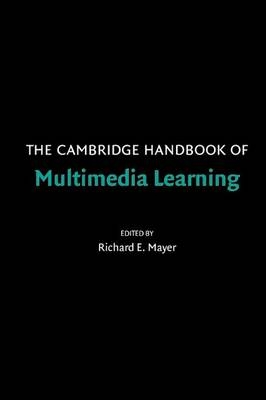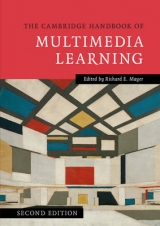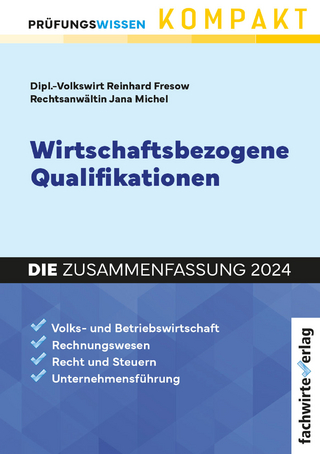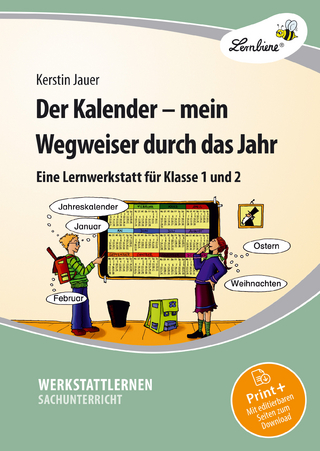
The Cambridge Handbook of Multimedia Learning
Cambridge University Press (Verlag)
978-0-521-83873-3 (ISBN)
- Titel erscheint in neuer Auflage
- Artikel merken
In the last decade, the field of multimedia learning emerged as a coherent discipline with an accumulated research base that had never been synthesized and organized in a handbook. The Cambridge Handbook of Multimedia Learning, first published in 2005, constituted the world's first handbook devoted to comprehensive coverage of research and theory in the field of multimedia learning. Multimedia learning is defined as learning from words (e.g., spoken or printed text) and pictures (e.g. illustrations, photos, maps, graphs, animation, or video). The focus of this handbook is on how people learn from words and pictures in computer-based environments. Multimedia environments include online instructional presentations, interactive lessons, e-courses, simulation games, virtual reality, and computer-supported in-class presentations. The Cambridge Handbook of Multimedia Learning seeks to establish what works (that is, to ground research in cognitive theory), and to consider when and where it works (that is, to explore the implications of research for practice).
Richard E. Mayer is Professor of Psychology at the University of California, Santa Barbara where he has served since 1975. He is the author of 18 books and more than 250 articles and chapters, including Multimedia Learning (2001), E-Learning and the Science of Instruction (2003) with Ruth Clark, and Learning and Instruction (2003).
Preface; 1. Introduction Richard E. Mayer; Part I. Theoretical Foundations: 2. Implications of cognitive load theory for multimedia learning John Sweller; 3. Cognitive theory of multimedia Richard E. Mayer; 4. Integrative model of text and picture comprehension Wolfgang Schnotz; 5. The four-component instructional design model: multimedia principles in environments for complex learning Jeroen van Merriënboer and Liesbeth Kester; Part II. Basic Principles of Multimedia Learning: 6. Five common but questionable principles of multimedia learning Richard Clark and David F. Feldon; 7. The multimedia principle J. D. Fletcher and Sigmund Tobias; 8. The split-attention principle in multimedia learning Paul Ayres and John Sweller; 9. The modality principle in multimedia learning Renae Low and John Sweller; 10. The redundancy principle in multimedia learning John Sweller; 11. Principles for managing essential processing in multimedia learning: segmenting, pre-training, and modality principles Richard E. Mayer; 12. Principles for reducing extraneous processing in multimedia learning: coherence, Signaling, redundancy, spatial contiguity, and temporal contiguity principles Richard E. Mayer; 13. Principles based on social cues: personalization, voice, and image principles Richard E. Mayer; Part III. Advanced Principles of Multimedia Learning: 14. The guided discovery principle in multimedia learning Ton de Jong; 15. The worked-out example principle in multimedia learning Alexander Renkl; 16. The collaboration principle in multimedia learning David Jonassen, Chwee Beng Lee, Chia-Chi Yang, and James Laffey; 17. The self-explanation principle in multimedia learning Marguerite Roy and Michelene T. H. Chi; 18. The animation and interactivity principles in multimedia learning Mireille Betrancourt; 19. Navigational principles in multimedia learning Jean Francois Rouet and Herve Potelle; 20. The site map principle in multimedia learning Amy Shapiro; 21. The prior knowledge principle in multimedia learning Slava Kalyuga; 22. The cognitive aging principle in multimedia learning Fred Paas, Pascal W. M. Van Gerven, and Huib K. Tabbers; Part IV. Multimedia Learning in Content Areas: 23. Multimedia learning of reading David Reinking; 24. Multimedia learning of history Jennifer Wiley and Ivan K. Ash; 25. Multimedia learning of mathematics Robert K. Atkinson; 26. Multimedia learning of chemistry Robert Kozma and Joel Russell; 27. Multimedia learning of meteorology Richard Lowe; 28. Multimedia learning about complex physical systems Mary Hegarty; 29. Multimedia learning of a second language Jan Plass and Linda Jones; 30. Multimedia learning of cognitive skills Susanna P. Lajoie and Carlos Nakamura; Part V. Multimedia Learning in Advanced Computer-Based Contexts: 31. Multimedia learning with animated pedagogical agents Roxana Moreno; 32. Multimedia learning in virtual reality Sue Cobb and Danae Stanton Fraser; 33. Multimedia learning with games, simulations and microworlds Lloyd Rieber; 34. Multimedia learning with hypermedia Andrew Dillon and Jennifer Jobst; 35. Multimedia learning in e-courses Ruth Clark.
| Erscheint lt. Verlag | 15.8.2005 |
|---|---|
| Reihe/Serie | Cambridge Handbooks in Psychology |
| Zusatzinfo | 34 Tables, unspecified; 8 Halftones, unspecified; 72 Line drawings, unspecified |
| Verlagsort | Cambridge |
| Sprache | englisch |
| Maße | 185 x 261 mm |
| Gewicht | 1322 g |
| Themenwelt | Schulbuch / Wörterbuch ► Unterrichtsvorbereitung ► Unterrichts-Handreichungen |
| Geisteswissenschaften ► Psychologie ► Allgemeine Psychologie | |
| Geisteswissenschaften ► Psychologie ► Pädagogische Psychologie | |
| Geisteswissenschaften ► Psychologie ► Verhaltenstherapie | |
| Sozialwissenschaften ► Pädagogik | |
| ISBN-10 | 0-521-83873-8 / 0521838738 |
| ISBN-13 | 978-0-521-83873-3 / 9780521838733 |
| Zustand | Neuware |
| Haben Sie eine Frage zum Produkt? |
aus dem Bereich



